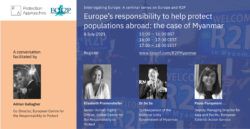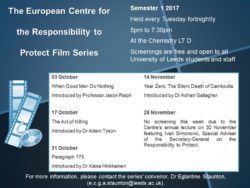Past Events
Last updated 5 March 2024
ECR2P Seminar Series: Regional Approaches to the Responsibility to Protect (R2P)
Wednesday 28 February 2024 | 14:00-15:00 | Online (Zoom)
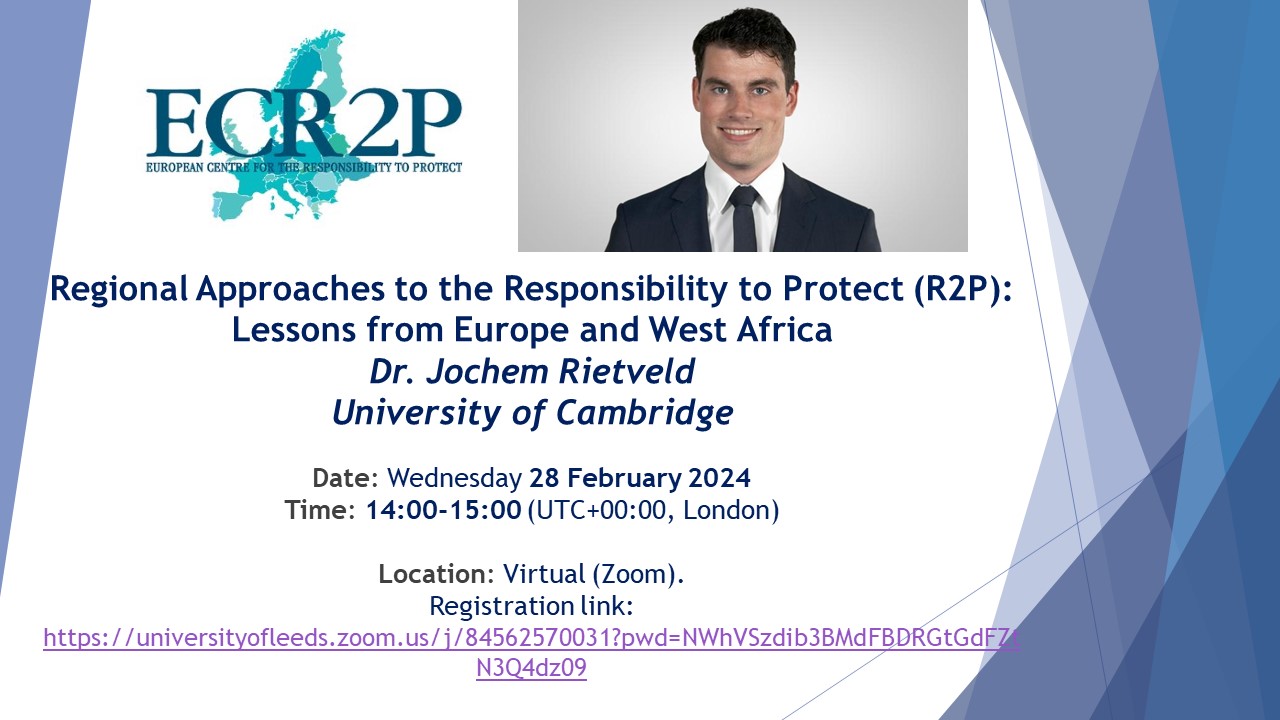
We invite you all to the first event in the ECR2P Seminar Series this semester! Dr Jochem Rietveld (University of Cambridge) will present his paper, 'Regional Approaches to the Responsibility to Protect (R2P): Lessons from Europe and West Africa'.
Dr Rietveld will talk about his recent book, Regional Approaches to the Responsibility to Protect (R2P): Lessons from Europe and West Africa (2023). Please see the presentation's abstract below:
Based on monograph published in 2023, the talk focuses on regional approaches to the Responsibility to Protect (R2P) in Europe and West Africa. It assesses how and to what extent the European Union (EU) and the Economic Community of West African States (ECOWAS) have internalised the R2P norm, both generally, in institutions, policies, and programs and specifically, in crisis situations of R2P concern. It provides a historical analysis of how the two regional organisations have dealt with questions of sovereignty, security, and human rights since their founding, as well as an analysis of some of the European and West African roots of the R2P norm. This reflects the notion that global norms are often informed by local and regional practices, which needs to be recognised in order to fully understand regional responses to alleged global norms. One of the key findings is that ECOWAS and West Africa have delivered a key contribution to the R2P norm construction, a finding insufficiently recognised in the current literature.
This event is hosted on Zoom on 28 February at 14:00-15:00. Please click the link to attend!
The UK's Approach to Operationalising Mass Atrocity Prevention
Date: Wednesday 13 December 2023 Time: 11:00-12:00 (UK time)
Location: Virtual. Register here.
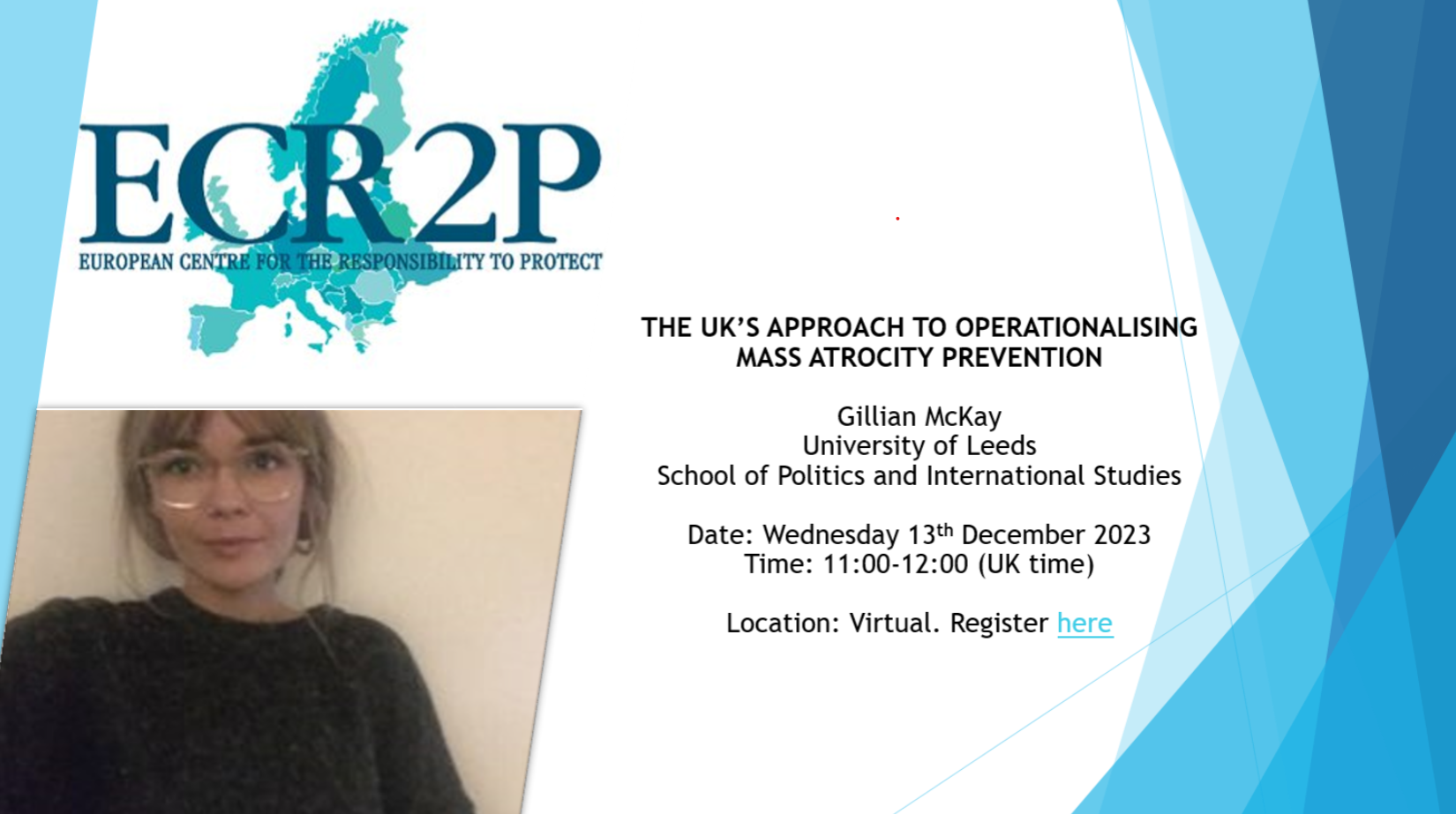
Speaker: Gillian McKay, University of Leeds, School of Politics and International Studies.
Title: The UK's Approach to Operationalising Mass Atrocity Prevention
Abstract: The UK government’s approach to preventing mass atrocities has been subjected to close scrutiny for several years, prompting institutional changes in the foreign office at a country level in 2019 and later at a departmental level in 2022. Nonetheless, research has revealed a lack of clarity around what atrocity prevention looks like for the UK in practice, and no in-depth academic study of the government’s operational approach has been conducted to date. In this presentation, I provide an overview of my thesis which seeks to address this gap by offering empirical insight into the way the UK has responded to the risk and commission of mass atrocity crimes in different contexts over time. The first part is primarily concerned with the UK’s approach broadly speaking, including the operational impact of conceptual shifts and institutional changes as well as the prospects for internalising the Responsibility to Protect. The second part sheds empirical light on the UK’s approach in four different contexts using four distinct tools, namely: targeted sanctions in Myanmar, defence cooperation with Saudi Arabia in the context of its war in Yemen, multilateral military assistance through MINUSMA in Mali, and bilateral development programming in Kenya. In doing so, I unpack an approach which is not only vulnerable to inconsistencies but also one which has been pervasively more responsive to the commission of atrocities than to the risk they might occur. This, I suggest, points to a reactive and incoherent approach to operationalising mass atrocity prevention. Having said that, recent developments are expected to facilitate a pivot towards a more proactive and coherent approach going forward. These findings therefore come at an important time for the government as it seeks to define and operationalise a new approach to preventing mass atrocities.
Bio: Gillian McKay is a PhD Candidate in the School of Politics and International Studies at the University of Leeds. Her research is focused on the United Kingdom’s approach to mass atrocity prevention, supervised within the European Centre for the Responsibility to Protect, and funded by the Economic and Social Research Council. Her academic background is in psychology and human rights law, and she has previously worked in the humanitarian and development sectors.
Mass Atrocities and Amazonian Indigenous Peoples in Bolsonaro's Brazil (2019-2022)
October 18 2023
University of Leeds
On the 18th October 2023, Lucas de Belmont of the ECR2P presented his research findings on the grave human rights violations perpetrated by President Bolsonaro’s regime and its allies, from 2019 to 2022, against Amazonian indigenous peoples in Brazil. The research draws on data gathered over the last year to discuss four themes: ‘Land is Life’, ‘Perpetrators and Human Rights Violations’, ‘Deforestation: farming, ranching, logging, and land-grabbing’, and finally ‘Deprivation of health: mining, and the pandemic.’ In so doing, it sheds new light on the mass atrocity crimes perpetrated against indigenous peoples in the Amazon.
The full presentation can be watched now.
BISA Working Group on Intervention and the Responsibility to Protect Annual Conference
November 18 2022
University of Leeds
On 18 November 2022, ECR2P will host the annual conference for the British International Studies Association’s Working Group on Intervention and the Responsibility to Protect.
The Conference Programme has now been released and can be viewed here: 2022 IR2P Conference Programme.
Please contact Professor Adrian Gallagher for more details.
WORKSHOP ON GENDER AND ATROCITY PREVENTION
July 8, 2022
Benjamin N. Cardozo School of Law
ECR2P Co-Director, Dr Cristina Stefan, has organised a one-day workshop on gender and atrocity prevention in partnership with Cardozo Law School.
This international event on July 8 invites experts on gender and atrocity prevention, with the keynote address being delivered by Alice Wairimu Nderitu, UN Under-Secretary-General and Special Adviser on the Prevention of Genocide, on Gender and the United Nations Office on Genocide Prevention and the Responsibility to Protect.
The workshop then has two specialist roundtables on Incorporating a Gender Lens into the UN Framework of Analysis for Atrocity Crimes: A Tool for Prevention and Gender, Women, Peace and Security, and the Responsibility to Protect, while former UN Special Advisor on the Responsibility to Protect, Dr Karen Smith, will speak on Moving beyond the UN 2020 Report of the Secretary-General “Prioritizing Prevention
and Strengthening Response: Women and the Responsibility to Protect”.
Full programme details are available here
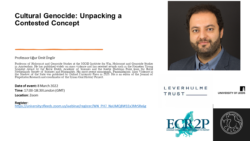
A recording of the event is available here
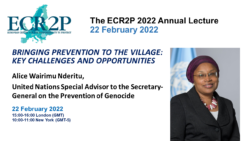
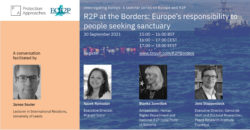
Registration is now open for the latest seminar series event on Europe and the R2P titled 'R2P at the Borders: Europe’s responsibility to people seeking sanctuary',
The conversation will be facilitated by Dr James Souter, Polis University of Leeds, and includes the following speakers:
Blanka Jamnišek – Ambassador, Human Rights Department and National R2P Focal Point of Slovenia
Jens Stappenbeck – Executive Director of Genocide Alert and Doctoral Researcher, International Peace Institute Frankfurt
Nazek Ramadan – Executive Director of Migrant Voice
To register for this event, please follow this link
20 Years: Idea, Inaction, and Implementation of the R2P
Liverpool, 1st - 2nd June 2021
In 2001, the International Commission on Intervention and State Sovereignty published its report on ‘The Responsibility to Protect’, paving the way for the idea to be adopted by the international community at the 2005 World Summit. For 20 years, the concept of the Responsibility to Protect has developed form its initial idea, faced the inaction of States and the United Nations Security Council, but has also seen progress in its implementation by ‘R2P Focal Points’ and in the UN General Assembly.
The 2020 Responsibility to Protect and Women, Peace and Security Double Anniversary:
A conversation on R2P at 15 and WPS at 20 followed by Q&A
EVENT DESCRIPTION:
December 17, 2020
9:00-10:45 New York (GMT-5) / 14:00-15:45 London (GMT)
This high-level interactive panel discussion marks a significant double anniversary, namely the 15th anniversary of the Responsibility to Protect (R2P) since its adoption at the UN in September 2005 and the 20th anniversary of Women Peace and Security (WPS) since the adoption of SC Resolution 1325 in October 2000.
- What are the key lessons learned from 15 years of R2P and atrocity prevention and 20 years of implementing the WPS agenda?
- What successes can we highlight for both?
- How can R2P and WPS be implemented closer together in light of their overlaps, including the gendered impact of atrocity crimes, the connections between gender equality and R2P, and the important roles women play in supporting protection and atrocity prevention?
Ambassador Liberata Mulamula, Ms. Debbie Stothard, Dr. Karen Smith, Ms. Savita Pawnday, Dr. Toni Haastrup, and Ms. Wai Wai Nu are the distinguished experts joining in conversation to reflect on the progress made on implementing the R2P and WPS agendas to date. They will discuss some of the key lessons learned and explore priorities and strategies for implementing these two complementary agendas going forward. The conversation is moderated by Dr. Cristina G. Stefan.
A recording of the event is available here
SPEAKERS BIOS:
| Ambassador Liberata Mulamula First female Foreign Affairs Permanent Secretary of Tanzania; Member of UN SG's Independent Eminent Persons for Peacebuilding Architecture Review; Associate Director Institute for African Studies at George Washington University |
| Dr Karen Smith UN Special Adviser of the Secretary-General on the Responsibility to Protect; University Lecturer in International Relations at the Institute for History at Leiden University |
| Ms Debbie Stothard Founder and Coordinator ALTSEAN-Burma; Former Secretary-General of The Board of The International Federation for Human Rights |
| Ms Jaclyn Streitfeld-Hall Publications Director, Global Centre for the Responsibility to Protect (GCR2P), leading on the GCR2P’s two signature publications, R2P Monitor and Atrocity Alert |
| Dr Toni Haastrup Senior Lecturer in International Politics at University of Stirling; Editor in Chief of JCMS; Serving on the Women Also Know Stuff (WAKS) Executive Committee |
| Ms Wai Wai Nu Founder and Director of Women's Peace Network; Award-winning Rohingya women’s rights activist; Former political prisoner; Fellow at the Center for Genocide Prevention, US Holocaust Memorial Museum |
| Dr Cristina G Stefan (Moderator) Associate Professor of International Relations at The University of Leeds; Founding Co-Director of the European Centre for the Responsibility to Protect (ECR2P) |
Human Rights Day collaborative event between ECR2P, ECR2Psoc and the University of Leeds Human Rights Journal
Thursday 10th December 5-6.30pm.
To celebrate the UN Human Rights Day, the Leeds Human Rights Journal in collaboration with ECR2P and the ECR2P Society are organising a Human Rights Day Event this Thursday, 10 December 2020, 5:00-6:30 p.m. Registration is available here.
Event speakers include:
Dr Cristina Stefan - Founding Co-Director of ECR2P, Associate Professor in International Relations
Topic: Norm entrepreneurship on R2P, both Western and Non-Western initiatives
Richard Illingworth – PhD researcher at POLIS and member of ECR2P
Topic: R2P as a failing cosmopolitan aspiration
Prof. Jason Ralph – Founding Research Director of ECR2P, Professor in International Relations
Topic: R2P and “Glocal” Britain
2020 ECR2P Annual Lecture
The Responsibility to Protect: The Dream and the Reality
Thu, 26 November 2020
09:00 – 10:15 GMT
ECR2P are delighted to welcome Gareth Evans, Distinguished Honorary Professor at the Australian National University, to deliver our 2020 annual lecture. Please register HERE
Gareth Evans takes stock of the extent to which R2P has both met and fallen short of the dreams of its founders since its endorsement by the 2005 World Summit. As an effective reactive counter-force to atrocity crimes already under way, R2P’s record has been disappointing. But as an institutional catalyst and preventive mechanism it has been generally successful, and as a normative force it has been, and remains, very influential.
Speaker
Gareth Evans is Distinguished Honorary Professor at the Australian National University, where he was Chancellor from 2010–19. He was a member of the Australian Parliament for twenty-one years, and a Cabinet Minister for thirteen, including as Foreign Minister from 1988–96. After leaving politics, he was President of the Brussels-based International Crisis Group from 2000–09. He co-chaired the International Commission on Intervention and State Sovereignty (2000–01), which initiated the ‘responsibility to protect’ concept, and is chair of the New York-based International Advisory Board of the Global Centre for the Responsibility to Protect. He has written or edited thirteen books, including The Responsibility to Protect: Ending Mass Atrocity Crimes Once and for All. (Brookings Institution Press, 2008).
The Responsibility to Protect in a changing world order
Thursday 17 Sep 2020, 14:30 - 15:30 BST
Via zoom
Register here
Participants: Adrian Gallagher (University of Leeds), Luke Glanville (Australian National University), Justin Morris (University of Hull), James Pattison (University of Manchester), Cristina Stefan (University of Leeds), Jennifer Welsh (McGill), Nicholas J Wheeler (Birmingham)
This roundtable brings together experts in the field to analyse the Responsibility to Protect in the context of a changing world order. The RtoP was born in a so-called ‘liberal era’. At the time, the Commission’s recommendations went to the very heart of international relations as they spoke to ‘state sovereignty’, ‘intervention’, ‘human rights’, ‘human security’ and the ‘question of authority’. Yet the perceived crisis in liberalism over the last decade has led academics to question whether we are experiencing ‘the end of the liberal International order?’ (Ikenberry 2018).
Against this backdrop, there is a pressing need to re-consider the RtoP in an era of shifting power balances. To do this, Adrian Gallagher, Justin Morris, and Nick Wheeler analyse the relationship between ‘responsibility’ and ‘trust’ in relation to the use of force. Despite the vast proliferation of RtoP literature over the past twenty years, this is the first article to focus on ‘trust’ and acts as a catalyst call for future research.
Cristina Stefan asks the pertinent question, ‘where is norm entrepreneurship twenty years on?’. In so doing, she shines a spotlight on Western and Non-Western norm shapers in an era of transitional change whilst also linking the RtoP to other global agendas such as Women, Peace and Security.
Luke Glanville and James Pattison look at the ethics of ‘prioritisation’ as they question, where states should prioritise their attention and resources? When one considers the increase in mass atrocities since 2010, there is an urgent need to grapple with the ethical complexities involved.
Finally, former Special Advisor to the UN Secretary-General on RtoP, Jennifer Welsh examines the way the UN Security Council has both acted, and failed to act, in fulfilling the RtoP in the 20 years since inception. It revisits the original report to identify two key issues for the contemporary ear of geopolitical rivalry. The proposed contributions are to be published as a roundtable in Ethics and International Affairs in 2021 with an introduction by Michael Ignatieff.
ECR2P 2019 Annual Lecture: Dr Karen Smith, the United Nations Special Adviser on the R2P
Monday 25th November 2019, 13:00-14:30

Roger Stevens Lecture Theatre 18 – see here for details and directions
The event is free, but registration is essential. Please register here
Please note that photos will be taken at this public event.
2019 ECR2P Research Seminar Series
Following its success in 2018, our seminar series will continue to provide researchers with the opportunity to present and receive feedback on their research from fellow R2P researchers.
Our seminars will run on the following schedule:
Tuesday 19 March. Room 14.33, level 14 Social Sciences Building, 3-4pm.
Richard Illingworth, ‘A Pragmatic Cosmopolitanism for the Responsibility to Protect’ - Chaired by Professor Garrett W. Brown
Thursday 25 April. Room 14.33, level 14 Social Sciences Building, 3-4pm.
Sabrina White, 'Accountability for Sexual Exploitation and Abuse in UN Peacekeeping: What's the Problem?' - Chaired by Dr. Adrian Gallagher
‘Responsibility to Protect and Gender’ Conference
University of Leeds, Monday 10 June 2019
Chemistry West Block, Room 1.80
The responsibility to protect (R2P) principle has been criticised for being gender-blind. According to its critics, not only has the focus on intervention as a protection mechanism reflected the masculine logic underpinning the principle, but the principle has also failed to take into account the profoundly gendered impact of mass atrocity crimes. In the context of such concerns, there has been a concerted effort, seen in some of the UN Secretary General’s annual reports on R2P, to render the principle more gender-sensitive. This has entailed paying greater attention to the differentiated impact of mass atrocity crimes on women and men and foregrounding the importance of gender and female empowerment in efforts to prevent mass atrocity crimes.
The aim of this conference is to take stock of these efforts and to assess how successful the efforts to incorporate gender into the protection agenda have been. We invite contributions from scholars and practitioners working on gender, R2P, peacebuilding and cognate fields. Confirmed participants include leading scholars in the area, such as Professor Jacqui True (Monash University).
We are interested in both conceptual and empirical contributions on the intersections between the topics of gender and the responsibility to protect, including but not limited to the following questions:
- How has the conceptualisation of gender within the responsibility to protect framework evolved since its inception in 2001?
- How is gender understood and applied into the practice of the responsibility to protect today?
- Is it possible to reconcile the ‘narrow but deep’ approach of the responsibility to protect with addressing structural forms of violence that women are often subjected to?
- The efforts to promote the responsibility to protect are increasingly focusing on prevention of mass atrocity crimes: how is gender understood and operationalised in atrocity prevention efforts?
- To what extent are resilience and capacity-building efforts, as outlined in pillar II of the R2P, gender-sensitive?
The full conference programme is available here
The deadline for abstracts has now passed. However, if you would like to attend the conference, please register your interest with Blake Lawrinson, b.w.lawrinson1@leeds.ac.uk.
POLIS Community Event: Mass Atrocity Prevention
A roundtable discussion with Professor Ivan Simonovic (former United Nations Special Advisor on the Responsibility to Protect), Dr Kate Ferguson (Protection Approaches), Dr Adrian Gallagher (ECR2P)
Monday 26th November, 2018. 13:00-14:00
Clothworkers' Building North (Room G. 12)
Synopsis: In April 2018, the UK Foreign Affairs Committee (FAC) launched an inquiry into the British Government’s approach to mass atrocity prevention under the Responsibility to Protect and humanitarian intervention. This followed previous inquiries into the UK’s role in relation to the atrocity crimes committed in the Rakhine State (December 2017), as well as three separate inquiries into the mass violence in Libya, Syria, and by the so-called the Islamic State (all in 2015). As a result, in September 2018, the FAC published its report ‘Global Britain: The Responsibility to Protect and Humanitarian Intervention’ in which it calls for ‘a cross-Government mass atrocity strategy that can help identify areas of high risk at an early stage’.
The roundtable discussion brings together world leading experts on the United Nations and the United Kingdom's approaches toward mass atrocity prevention in order to discuss what is being done, what are the key challenges going forward, and how can these be overcome.
The roundtable will ask the speakers to speak for a maximum of 10 min each followed by 20 mins of questions from the audience.
ECR2P Film Series: The Whistleblower
Introduced by: Sabrina White
When: Tuesday 4 December, 2018. 5:15-7:30
Where: Parkinson Room B.09
About the ECR2P Film Series:
Every fortnight (on Tuesdays from 5:15 to 7:30pm), a fictional film or documentary related to human protection will be shown. It will be introduced by a POLIS staff member who will also facilitate a post-screening discussion.
Screenings are free and open to all University of Leeds students and staff.
Note: Due to the nature of the topics discussed, you may find some parts of the movies upsetting
ECR2P Film Series: Shake Hands with the Devil

Introduced by: Dr Cristina G. Stefan
When: Tuesday 16 October, 2018. 5:15-7:30
Where: Parkinson Room B.09
About the ECR2P Film Series:
Every fortnight (on Tuesdays from 5:15 to 7:30pm), a fictional film or documentary related to human protection will be shown. It will be introduced by a POLIS staff member who will also facilitate a post-screening discussion.
Screenings are free and open to all University of Leeds students and staff.
Note: Due to the nature of the topics discussed, you may find some parts of the movies upsetting
ECR2P Film Series: The Peacekeepers

Introduced by: Blake Lawrinson
When: Tuesday 30 October, 2018. 5:15-7:30
Where: Parkinson Room B.09
About the ECR2P Film Series:
Every fortnight (on Tuesdays from 5:15 to 7:30pm), a fictional film or documentary related to human protection will be shown. It will be introduced by a POLIS staff member who will also facilitate a post-screening discussion.
Screenings are free and open to all University of Leeds students and staff.
Note: Due to the nature of the topics discussed, you may find some parts of the movies upsetting
ECR2P Film Series: Camp 14: Total Control Zone

Introduced by: Ben Willis
When: Tuesday 13 November, 2018. 5:15-7:30
Where: Parkinson Room B.09
About the ECR2P Film Series:
Every fortnight (on Tuesdays from 5:15 to 7:30pm), a fictional film or documentary related to human protection will be shown. It will be introduced by a POLIS staff member who will also facilitate a post-screening discussion.
Screenings are free and open to all University of Leeds students and staff.
Note: Due to the nature of the topics discussed, you may find some parts of the movies upsetting
ECR2P 2018 Annual Lecture: Professor Jennifer Welsh, Former UN Assistant Secretary-General and Special Adviser on the R2P
Monday 22nd October 2018, 17:15-19:00
 Location: Conference Auditorium 2 (GM.01) this room is wheelchair accessible – see here for details and directions
Location: Conference Auditorium 2 (GM.01) this room is wheelchair accessible – see here for details and directions
Registration: The event is free, but registration is essential. Please register here
Please note that photos will be taken at this public event.
Conference of the BISA Intervention & R2P Working Group
‘Alternatives to military intervention under R2P’
Fri 21 September 2018, 09:00 – 18:30
Venue: Charles Thackrah Building, 1.01-1.04
This year the general theme will be ‘alternatives to military intervention under R2P’. The choice of topic is because much of the R2P literature to date has focused on the military (and often contentious) aspects of R2P. At this event, we will have papers that will explore the case for non-military ways of addressing mass atrocities, under the second and third pillars of R2P. This will include both the ‘reactive’ measures of R2P, as well as some of the ‘preventive’ ones, specifically those concerned with ‘direct’ or ‘imminent’ prevention. There is potential to create a special issue as an output from the workshop.
The keynote speaker for this event will be Joanne Neenan, who works with the FCO and the LSE (speaking in a personal capacity). Joanne is an international lawyer and a diplomat who works on Women, Peace and Security, and formerly worked with the UK Mission to the United Nations.
We are also holding a roundtable on James Pattison's new book The Alternatives to War, which will include presentations from Cristina Stefan, Stephen McLoughlin, and Chris Finlay.
The conference programme for the day is available here
We will also have some general sessions, for those members who are working on other topics related to intervention and R2P.
Topics include:
• UN sanctions
• Peace vs justice
• The UN’s relationship with the International Criminal Court
• Regional organisations and R2P
• UN Security Council practices in responding to mass atrocity crimes
• Legitimacy and the implementation of R2P
• Unarmed civilian peacekeeping
• Any other topics connected to R2P and intervention
Attendance and participation is not limited to members of BISA or the working group. Please register here
Lunch and tea/coffee will be provided on the day.
The winners of the annual book and ECR article awards will also be announced.
University of Queensland Symposium
The Future of Norm Studies Research
Friday July 20th 2018.
One of ECR2P's key research themes is "R2P and Norm Theory" which involves our researchers engaging with Norm Studies which has grown to be a significant strand of International Relations theory over the last two decades. To develop this, Dr. Gallagher has organised a one day workshop 'The Future of Norm Studies Research' to be held at the University of Queensland on July 20th 2018. To do this, he is working with Antje Wiener (Hamburg), Sarah Percy (University of Queensland) and Phil Orchard (University of Wollongong). The workshop is co-funded by the University of Queensland, the University of Leeds, and the Asia-Pacific Centre for the Responsibility to Protect. This follows on from Dr. Gallagher's ISA Catalyst workshop ‘Tacking Stock of the Past to Shape the Future of Norm Studies’. Held in Baltimore, February 2017. For all enquires email a.gallagher@leeds.ac.uk
The ‘Responsibility to Protect’: Interdisciplinary perspectives and future directions for research
Date & Time: Wednesday 6 June 2018, 2pm – 4pm
Venue: Seminar room 14.33, Social Sciences Building, University of Leeds
The Responsibility to Protect (R2P) agreement was unanimously endorsed by United Nations member states in 2005 as a commitment to protect people from genocide, war crimes, ethnic cleansing, and crimes against humanity. The principle commits states not only to the protection of their own populations – something already deeply embedded in international human rights law – but also to the populations of other states, most importantly through international assistance or action when states are manifestly failing to provide protection. However, the operationalization of R2P has been deeply controversial. This seminar will explore cutting-edge perspectives on R2P from different disciplinary perspectives, based upon the final doctoral research results of three PhD students who are White Rose DTC network award holders, supervised by cross-institutional teams in Leeds, Sheffield and York. The event will also feature researchers attached to the European Centre for the Responsibility to Protect, based at the University of Leeds, who will consider future directions for R2P research.
The main presentations will be:
• Chloë Gilgan, Centre for Applied Human Rights, Research Centre for the Social Sciences, University of York: ‘The UK’s commitment to the Responsibility to Protect norm and its resettlement policies on Syrian refugees fleeing mass atrocities’.
• Samuel Jarvis, Department of Politics, University of Sheffield: ‘The Responsibility to Protect and the Limits to Moral Progress: Assessing ‘Common Humanity’ as a Driver of State Behaviour’.
• Daniel Wand, School of Politics and International studies, University of Leeds: ‘The International Criminal Court and the BRICS States: Solidarist Progress and Pluralist Limits in a Changing International Society’.
Abstracts
The UK’s commitment to the Responsibility to Protect norm and its resettlement policies on Syrian refugees fleeing mass atrocities – Chloë Gilgan
This presentation considers how powerful liberal states that support R2P, like the UK, are using the resettlement of refugees to partly fulfil their responsibility to protect Syrians from mass atrocities. While academics and R2P advocates presume a link between R2P and resettlement, the research revealed three important outcomes. First, the notion that resettlement is automatically linked to R2P presents unavoidable conceptual gaps that have not been addressed in the literature. Second, regardless of the aspirational R2P arguments for providing resettlement as R2P protection, liberal humanitarian states like the UK have not made the link on a practical level. As a permanent member of the UN Security Council and a member of the International Syria Support Group, the UK is a key player in the international effort to address the Syrian crisis. The research disaggregated the UK’s discursive and practical understanding of what it means to discharge its responsibility to protect Syrians from mass atrocities in the context of resettlement across some of the relevant agencies that comprise the UK government. The findings stem from the interpretative analysis of two primary sources: Official documents and interviews from parliament, the FCO, the Home Office and DFID. The research revealed that misconceptions around R2P, especially its conflation with military intervention, have not only prevented consensus on the UN Security Council but have resulted in the UK’s failure to link R2P to existing national responses that would fit within R2P’s remit of using ‘diplomatic, humanitarian and other peaceful means’ to help protect Syrians from mass atrocities. This is due to the relevant agencies in the UK possessing different understandings of what constitutes R2P implementation. Thus, the research is highly relevant for evaluating the normative force of R2P when a state’s usual or preferred responses are impossible, and the crisis persists. Finally, the third outcome of the research revealed that civil society does not use R2P as leverage when advocating to states for increased resettlement for several reasons that will also influence R2P’s norm status.
‘The Responsibility to Protect and the Limits to Moral Progress: Assessing ‘Common Humanity’ as a Driver of State Behaviour’ – Samuel Jarvis
The philosophical and moral foundations of humanity’s relationship to the Responsibility to Protect have for a long time remained a largely overlooked element of the R2P literature. Whilst more recent scholarship has attempted to close this theoretical gap, it has most often focused on humanity as a moral benchmark in which to measure the current progress of the R2P against. However, what still remains highly contested is the extent to which humanity can in fact provide the significant normative weight and metaphysical heavy lifting for such moral arguments. In response to this lacuna, the thesis focuses on two central questions. Firstly, does the concept of humanity provide a sufficient justification for why states should have a moral responsibility to protect those threatened by mass atrocity crimes? Secondly, to what extent can humanity function as a motivational force able to mobilise states in support of the R2P principle? In addressing these two questions, the thesis provides a more comprehensive understanding of humanity through locating its significant dual function, thus reinforcing the critical role humanity plays in underpinning the moral foundations of the central R2P crimes, as well as challenging the extent to which humanity can also motivate states to act on its behalf. In this sense, the concept of humanity can be best understood as a motivational factor that diminishes in influence as the R2P principle is diffused into action. The thesis therefore provides the foundations for a more intuitive understanding of the complex motivational factors involved in generating collective responses to the threat of mass atrocity crimes. In doing so, it is argued that the ability to fundamentally address the current R2P implementation gap will require an approach that is more reflective of the way humanity interacts with competing moral, legal and political pressures at the global level.
Solidarist Progress and Pluralist Limits in a Changing International Society – Daniel Wand
This research project examines the relationship between the International Criminal Court (ICC) and the BRICS States using an English School approach. The purpose of the project is twofold. First, it provides an original, comprehensive understanding of the views of the BRICS on the nature and operation of the world’s first permanent international criminal court, and how their interactions with it have affected the institution. Second, the project addresses the broader issue of the sustainability of liberal international society in the context of the progressive decline of the West and the rise of emerging powers, and using the ICC/BRICS data it advances an original understanding of how rising powers view global governance.
It was found, quite surprisingly, that the BRICS are generally supportive of the ICC and its work, which is consistent with their longstanding support for international criminal justice, but only to the extent that the Court does not seriously challenge the fundamental primary institutions of international society (i.e. sovereignty, diplomacy, multilateralism) or prevent pragmatic, state-based responses to transitional justice where they are most appropriate. It is thus established that the BRICS states support and have advanced cosmopolitan progress in the form of international criminal justice in international society but have pushed back against it where they have been required to defend a pluralist approach to global governance. It therefore be surmised that the issue for the BRICS is not cosmopolitan moral progress but how it is implemented. We are therefore unlikely to see any revolutionary change in international society but, if the balance of power continues to shift, the progression towards a world society understanding of global political order is likely to be halted and reversed in favour of a more pluralist conception.
The Question of Genocide Determination and the Response of the International Judicial System
Tuesday 20 March 2018, 12:00 – 2.00 PM
Committee Rm G House of Lords, UK Parliament
Confirmed speakers include: ECR2P Research Director, Dr Adrian Gallagher and the GCR2P's, Dr Simon Adams among other experts.
Speakers will consider Lord (David) Alton's Genocide Determination Bill, a private members’ bill, with the aim to ‘provide for the High Court of England and Wales to make a preliminary finding on cases of alleged genocide; and for the subsequent referral of such findings to the International Criminal Court or a special tribunal'. A comparable Bill has been introduced in the Commons by Fiona Bruce MP.
Speakers will explore the question of genocide determination and HMG's argument that it is for the 'international judicial system' to determine genocide. The event is hosted by Lord Alton of Liverpool and Fiona Bruce MP, Member of Parliament for Congleton, and co-sponsored by the APPG on the Prevention of Genocide & Crimes Against Humanity.
European Centre for the Responsibility to Protect Research Seminar Series
The ECR2P's new seminar series provides R2P researchers with the opportunity to present and receive feedback on their research from fellow R2P researchers. The seminars will take place on Mondays 3:30-4:30.
Monday 5 Feb. Board Room. Level 13 Social Sciences Building.
Chiara de Franco, ‘The practices of protection: understanding how the EU ‘does’ protection of civilians'
Monday 19 Feb. Board Room. Level 13 Social Sciences Building.
Adrian Gallagher (w/Docherty), “Investigating the role of expectations in norm dynamics: Divergent expectations over the 2011 military intervention in Libya”
Monday 19 March. (Location tbc).
Blagovesta (w/Alex Bellamy), “R2P and the Emergence of Responsibilities across Borders”.
Monday 16 April. Board Room. Level 13 Social Sciences Building.
Georgiana Epure, “The Responsibility to Prosecute: History and Politics”
Monday 21st May. Board Room. Level 13 Social Sciences Building
Jason Ralph and Sam Jervis: "The role and responsibility of the UK as a permanent member of the Security Council after the decision to leave the European Union"
Protecting Human Rights in a Changing and Insecure World
Monday 15th January 2018, 10am-4pm
Supported by the BISA Postgraduate Network
Conference Outline
This one-day conference, to be held at the University of Leeds on 15th January 2018, seeks to reflect on the challenges associated with protecting human rights in a changing and insecure international society. More specifically, the conference aims to interrogate and shed some light on the following issues:
- The extent to which ‘backlash’ against the protection of human rights is occurring;
- The ways in which it is occurring;
- The reasons and influences behind this development;
- The consequences for the protection of human rights including the operation of international institutions and regimes; and
- What can be done to protect and enforce human rights in this environment?
The purpose of this conference is to bring together academic researchers, particularly those undertaking a doctorate or in the early stages of their research careers, with those involved in policy or the practice of human rights protection broadly conceived. The aim is to examine the current challenges to human rights protection and to identify solutions from academic, policy and practice perspectives.
The conference will provide an opportunity for doctoral students and early career researchers to engage with each another and share their work, as well as with those working in policy and practice. One of the goals of the conference is to support interdisciplinary approaches and collaboration, so preference will be given to those taking an interdisciplinary approach to their work and to those focusing on under-researched topics and issues.
Location: SR 1.05, Charles Thackrah Building – this room is wheelchair accessible – see here for details and directions
If you would like to attend the conference but do not wish to present your research, please indicate your desire to attend to Daniel Wand ptdjhw@leeds.ac.uk
International Conference on The Responsibility to Protect, Peace & Security
Tuesday 12th December 2017, 09:00 – Wednesday, 13th December 2017, 17:30.
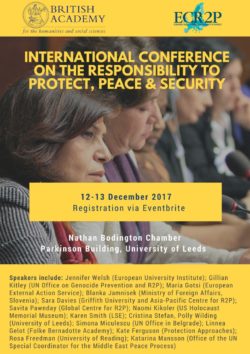 This two-day international conference brought together women with expertise as senior academics, researchers, diplomats, active civil society representatives, and senior policy-makers, working in fields related to the Responsibility to Protect, Peace and Security. The conference also provided a platform for experts to discuss their research and work, and relates to the British-Academy-funded establishment of The Women Network on the Responsibility to Protect (R2P), Peace and Security: Research and Impact. The event is organised by Dr Cristina Stefan, Co-Director of the European Centre for the Responsibility to Protect, based at the University of Leeds, and recipient of the British Academy Rising Star Engagement Award, from the British Academy, for 2017-2018, which funds this event.
This two-day international conference brought together women with expertise as senior academics, researchers, diplomats, active civil society representatives, and senior policy-makers, working in fields related to the Responsibility to Protect, Peace and Security. The conference also provided a platform for experts to discuss their research and work, and relates to the British-Academy-funded establishment of The Women Network on the Responsibility to Protect (R2P), Peace and Security: Research and Impact. The event is organised by Dr Cristina Stefan, Co-Director of the European Centre for the Responsibility to Protect, based at the University of Leeds, and recipient of the British Academy Rising Star Engagement Award, from the British Academy, for 2017-2018, which funds this event.
The topics covered include:
• The Global State of R2P, Peace and Security Research, from the Perspectives of Women Academics and Practitioners
• Researching Women, Peace and Security
• Assessing the Importance of an Atrocity Prevention Focus
• Regional Contexts of Violence and Protection, including perspectives regarding Asia, Africa, Europe, Latin America
• Assessing Protection Responsibilities in the European context
• International Law, Human Rights, and the United Nations
• Insights on Bridging the Gaps: From Academics to Policy-Makers, from Research to Impact
ECR2P 2017 Annual Lecture: Dr Ivan Šimonović, UN Assistant Secretary-General and Special Adviser on the R2P
Thursday 30th November 2017, 17:00-19:00
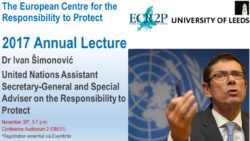
Location: Conference Auditorium 2 (GM.01) this room is wheelchair accessible – see here for details and directions
Registration: The event is free, but registration is essential. Please register here
Please note that recordings and photos will be taken at this public event.
Mass Atrocity Prevention in Practice Roundtable: Gender-Based Mass Atrocity Prevention
Monday 27 November, 2017 at 14:00-17:00

Until recently the human rights of women, have been marginalised from the mainstream human rights discourse. This is largely because women have been excluded from both the substance and the process of international human rights law. Issues concerning their rights were mainly considered to belong to the private sphere and their violation was often defended in the name of culture. The Report of UN Secretary General on R2P in 2013 notes that “gender discrimination and inequality increase the underlying risks associated with sexual and gender-based violence” and highlighted the nexus between gender and mass atrocity crimes. The UN Framework of Analysis for the Prevention of Atrocity Crimes stresses the need to dedicate specific attention to ‘acts of violence against women and children, or creation of conditions that facilitate acts of sexual violence against those groups’ and integrates gender in the early warning analysis of situations at risk. The UN Resolution 2171/2014 acknowledges that gender-based violence can be ‘an early indication of a descent into conflict or escalation of conflict’.
In the light of the increasing acknowledgement of gender-based violence as an especially prevalent feature of mass atrocity crimes, and the ongoing sexual violence in several countries including Syria, it is imperative to highlight the specific legal, political, and practical challenges posed by ’rape as a weapon of war.’ By combining practitioner and scholarly perspectives, feasible prevention options need to be discussed. The event is organised by the Budapest Centre in cooperation with its partners within The European Centre for the Responsibility to Protect (ECR2P) and the Károli Gáspár University of the Reformed Church in Hungary.
Location: Károli Gaspard University of the Reformed Church in Budapest, Hungary, Ráday u. 28. The event is public but registration is required. Please register here
ECR2P Film Series: Year Zero: The Silent Death of Cambodia
Introduced by: Dr Adrian Gallagher
When: Tuesday 14 November 2017, 5-7:30pm
Where: Chemistry LT D, University of Leeds (Wheelchair accessible)
About the ECR2P Film Series:
Every fortnight (on Tuesdays from 5 to 7:30pm), a fictional film or documentary related to human protection will be shown. It will be introduced by a POLIS staff member who will also facilitate a post-screening discussion.
Screenings are free and open to all University of Leeds students and staff.
ECR2P Film Series: Paragraph 175
Introduced by: Dr Kaisa Hinkkainen
When: Tuesday 31 October 2017, 5-7:30pm
Where: Chemistry LT D, University of Leeds (Wheelchair accessible)
About the ECR2P Film Series:
Every fortnight (on Tuesdays from 5 to 7:30pm), a fictional film or documentary related to human protection will be shown. It will be introduced by a POLIS staff member who will also facilitate a post-screening discussion.
Screenings are free and open to all University of Leeds students and staff
ECR2P Film Series: The Act of Killing
Introduced by: Dr Adam Tyson
When: Tuesday 17 October 2017, 5-7:30pm
Where: Chemistry LT D, University of Leeds (Wheelchair accessible)
About the ECR2P Film Series:
Every fortnight (on Tuesdays from 5 to 7:30pm), a fictional film or documentary related to human protection will be shown. It will be introduced by a POLIS staff member who will also facilitate a post-screening discussion.
Screenings are free and open to all University of Leeds students and staff.
ECR2P Film Series: When Good Men Do Nothing
Introduced by: Professor Jason Ralph
When: Tuesday 03 October 2017, 5-7:30pm
Where: Chemistry LT D, University of Leeds (Wheelchair accessible)
About the ECR2P Film Series:
Every fortnight (on Tuesdays from 5 to 7:30pm), a fictional film or documentary related to human protection will be shown. It will be introduced by a POLIS staff member who will also facilitate a post-screening discussion.
Screenings are free and open to all University of Leeds students and staff.
V4 Report Launch & Discussion Capabilities of the Visegrad Group in Preventing Extremism
Friday 23 June 2017 at 9.30

The V4 Task Force on Mass Atrocities Prevention is an initiative of the Budapest Centre for Mass Atrocities Prevention, in collaboration with the Institute for Foreign Affairs and Trade (Hungary), NOHA – University of Warsaw (Poland), the Slovak Foreign Policy Association (Slovakia), expert from the Czech Republic, and supported by the International Visegrad Fund. This is the final event of the V4 Task Force Initiative to map the capabilities of the Visegrad group in preventing extremism.
The 10-month Initiative was announced last September 2016 and followed the successful experience
obtained by the Budapest Centre during the activities of the 2013 EU Task Force on Mass Atrocities
Prevention and the 2016 African Task Force on Mass Atrocities Prevention. The event organized by the BCMAP in cooperation with the Institute of Foreign Affairs and Trade will provide the opportunity for participants to learn the outcomes of the Task Force's activities and discuss the recommendations of the Task Force for the follow up of the Initiative.
Location: Institute for Foreign Affairs and Trade, 13-15. Bérc utca, Budapest 1016. The event is public but registration is required. Please register here
Book Launch & Roundtable Discussion: Protecting Human Rights in the 21st Century
Thursday May 4th 2017, 16:00-18:00

Location: University of Leeds, Michael Sadler Building, SR (LG.15) – this room is wheelchair accessible – see here for details and directions
A Conversation on the role of International Criminal and Humanitarian Law in today's world with ICC Judge Howard Morrison
Tuesday 21 March, 16:30-18:00

Location: University of Leeds, Michael Sadler Building, SR (LG.19) - this room is wheelchair accessible - see here for details and directions
The Cost of Doing Nothing
 Thursday 16th March 2017, 16:00-17:30
Thursday 16th March 2017, 16:00-17:30
Location: University of Leeds, Chemistry Building Lecture Theatre D. (G.35) - this room is wheelchair accessible - see here for details and directions
Before her tragic death, Jo Cox MP was working on a report “The Cost of Doing Nothing” in which she warns against the “rise of ‘unthinking pacifism’” and “anti-interventionism” .
Join the R2P Student Coalition as Dr. Adrian Gallagher presents on “The Cost of Doing Nothing” report followed by a Q&A.
ECR2P@Leeds POLIS Launch: Guest Lecture by Professor Alex Bellamy "Implementing R2P: Progress, Challenges and the Next 10 Years"
Thursday December 8th 2016
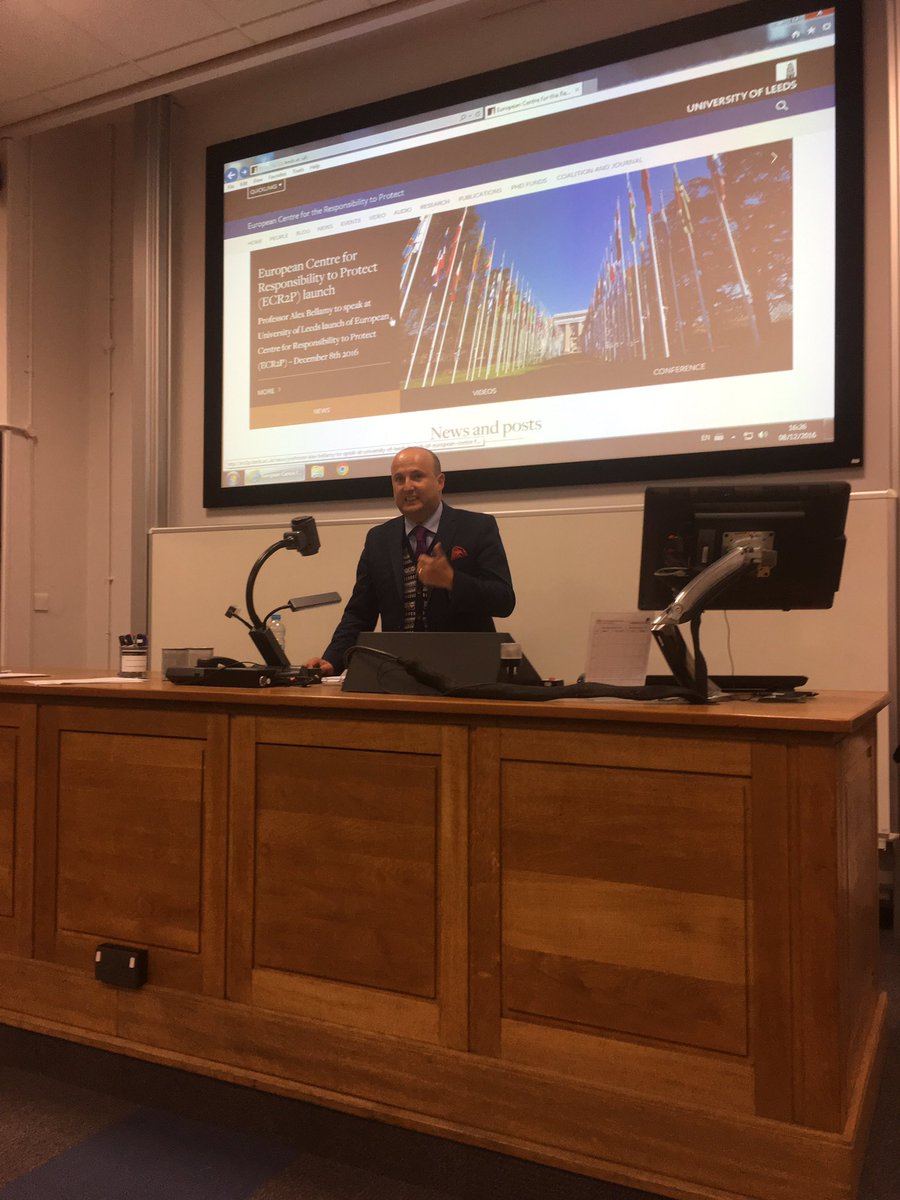
Photo courtesy of Dr Jess Gifkins.
When it comes to R2P, most of the normative struggle is now behind us while most of the operational challenges are still before us. Recognizing that a gap has emerged between the world’s normative commitment to R2P and its ability to make this principle a living reality, this talk called for a more comprehensive approach to the practice of R2P. This must include the full range of actors that play a role in inhibiting atrocity crimes and protecting vulnerable populations, including the new European Centre for R2P at the University of Leeds.
Professor Bellamy's talk combined analysis of the normative effort to win support for the R2P principle with an examination of international responses to major crises since 2009, such as those in the Middle East (Libya, Syria, Yemen) and sub-Saharan Africa (DRC, South Sudan, Mali, CAR), as well as some critical cases before that time (notably Kenya and Sri Lanka). It suggested that whilst tangible progress has been made, significant challenges remain ahead that will require a redoubling of effort.
Listen to the lecture here, or download the recording (MP3, 23MB)
Putting the Responsibility to Protect at the Centre of Europe
Thursday 13th and Friday 14th October, 2016
 This conference addressed the state of R2P at the global level and reflected on European perspectives.
This conference addressed the state of R2P at the global level and reflected on European perspectives.
Topics covered included ethics, gender, humanity, refugees and international law.
The Conference was held in University House on Thursday 13th and Friday 14th October, 2016.
Details of the conference programme, speakers, organisers as well as audio and video recordings of the presentations can currently be accessed on the conference website here.

